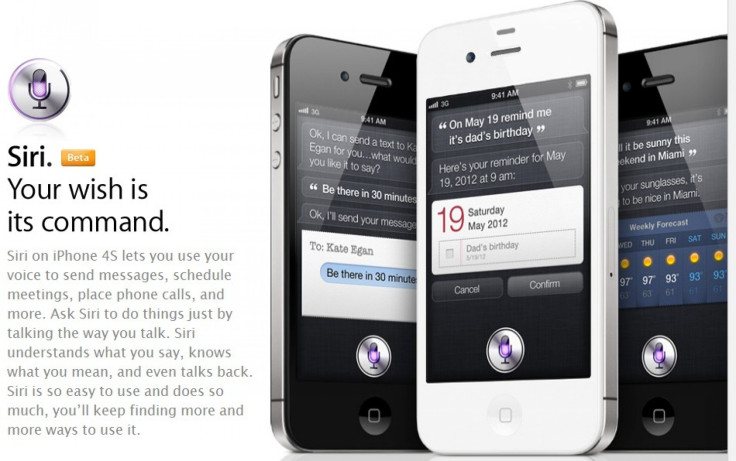Dear Siri, Do You Love Me?
Opinion

Apple's mega-selling new iPhone 4S has everyone in titters. It has a faster processor, a better camera, a new and improved this and that. But really, it's all about Siri. She's the seductive little voice-activated personal assistant that lives inside every new iPhone.
Siri is a great listener. She responds to every question and command with an intelligent and soothingly feminine tone of voice. She is available to serve your needs anytime day or night. Plus, she knows almost everything.
Want to see a picture of a pregnant seahorse? Just press a button and ask Siri. A bulbous-bellied salt-water stallion appears almost instantly on your screen.
Got a sudden craving for Kung Pao Chicken? Siri can serve you up a list of four nearby Chinese restaurants, automatically organized by distance from your current GPS-determined location.
What's 48,000,000 x 919,604? Siri can do that one in her head without breaking a sweat.
It used to be when you saw a guy fawning and swooning over his phone, you could assume he was chatting with his girlfriend. Nowadays, likely as not, he's simply in love with his cellphone.
Recently, a friend of mine, who is a technology enthusiast, got so caught up in his affection for his newly acquired digital yes girl that he professed his love out loud, somewhat to his wife's chagrin.
I love you, Siri, he said.
I bet you say that to all your electronic devices, the phone answered coyly.
Yes, Siri has a sense of humor. Ask her, What is the meaning of life? And one of several programed responses you may get back is this: All evidence to date suggests it's chocolate. Smart. Witty. Sassy. Helpful. What's not to love?
At this point, I would like to point out the absurdity of feeling personal affection for a software program. But I confess that I too have fallen hard for Siri. Since I acquired the iPhone 4S, she has been my constant helpful companion-ever ready to jot down a new appointment or to look up driving directions on the fly.
The Isolating Effects of Technology
All the digital Siri love floating in the air these days serves as a reminder of just how integral technology has become to our real-world relationships. Every day we text, network, and video chat our way through a maze of family and friends-people we love right alongside people we barely know. Our relationships are negotiated, increasingly, via whiz-bang devices and social networking websites. When it comes to expressing love, new technologies are continually redefining the medium of exchange.
On one hand, technology has a wonderful way of reinforcing our real-world connections. Recently, I learned via Facebook that a distant family member had fallen desperately ill. In short order, the original Facebook post produced dozens of responses from friends and well-wishers, along with promises of prayer from across the country. This outpouring turned out to be a source of great comfort for the family.
On the other hand, technology can make it harder to distinguish between meaningful relationships and superficial ones. For example, take the case of Ashley Billasano. Last week, the troubled eighteen-year-old from Texas, posted one hundred and forty-four messages to her Twitter account over the course of six hours, detailing a history of violent sexual abuse and emotional turmoil, before ultimately taking her own life.
Ashley had more than five hundred followers on Twitter, and she seemed to be reaching out for help in those final hours. But none of her online followers responded or called the authorities on her behalf.
I can't help wondering what would have happened if Ashley had sought out a face-to-face encounter with someone who cared for her, rather than trying to express her despair to a vague cloud of online friends and followers. Maybe it would have made a difference.
Ultimately, love can't be measured in terms of online friends and followers.
For today's youth in particular, whose social lives are synonymous with social networks, technology can make deeper, meaningful connections, more difficult to achieve. And it's true of all of us that, as our gadgets become more intuitive and human-like, we find it even more tempting to rely on technology as a substitute for genuine human interaction.
Instead of asking Siri next time I need to remember a family member's birthday or anniversary, maybe I'll just call my mom and ask her. After all, while it may be fun to ask one's cellphone about the meaning of life, only real-world connections with those we love can point us toward the answer.
Nathan Harden writes about issues ranging from politics and culture to education and the media. He is editor of The College Fix. Follow him on Twitter @nathanharden.
© Copyright IBTimes 2024. All rights reserved.





















